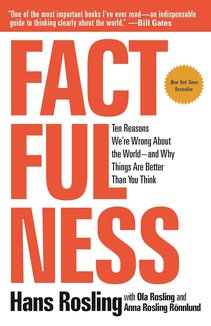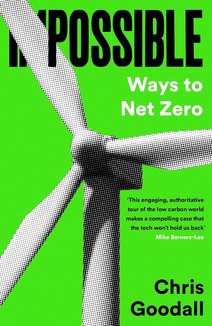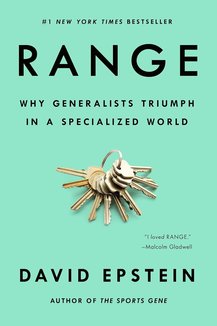Recommended Books

Factfulness: Ten Reasons We're Wrong About the World--and Why Things Are Better Than You Think
Authors:
Hans Rosling
,
Anna Rosling Rönnlund
,
Ola Rosling
ISBN 13:
978-1250123824
INSTANT NEW YORK TIMES BESTSELLER “One of the most important books I’ve ever read―an indispensable guide to thinking clearly about the world.” – Bill Gates “Hans Rosling tells the story of ‘the secret silent miracle of human progress’ as only he can. But Factfulness does much more than that. It also explains why progress is so often secret and silent and teaches readers how to see it clearly.” ― Melinda Gates " Factfulness by Hans Rosling, an outstanding international public health expert, is a hopeful book about the potential for human progress when we work off facts rather than our inherent biases." - Former U.S. President Barack Obama Factfulnes s: The stress-reducing habit of only carrying opinions for which you have strong supporting facts. When asked simple questions about global trends― what percentage of the world’s population live in poverty; why the world’s population is increasing; how many girls finish school ―we systematically get the answers wrong. So wrong that a chimpanzee choosing answers at random will consistently outguess teachers, journalists, Nobel laureates, and investment bankers. In Factfulness , Professor of International Health and global TED phenomenon Hans Rosling, together with his two long-time collaborators, Anna and Ola, offers a radical new explanation of why this happens . They reveal the ten instincts that distort our perspective ―from our tendency to divide the world into two camps (usually some version of us and them ) to the way we consume media (where fear rules) to how we perceive progress (believing that most things are getting worse). Our problem is that we don’t know what we don’t know, and even our guesses are informed by unconscious and predictable biases. It turns out that the world, for all its imperfections, is in a much better state than we might think. That doesn’t mean there aren’t real concerns. But when we worry about everything all the time instead of embracing a worldview based on facts, we can lose our ability to focus on the things that threaten us most. Inspiring and revelatory, filled with lively anecdotes and moving stories, Factfulness is an urgent and essential book that will change the way you see the world and empower you to respond to the crises and opportunities of the future. --- “This book is my last battle in my life-long mission to fight devastating ignorance…Previously I armed myself with huge data sets, eye-opening software, an energetic learning style and a Swedish bayonet for sword-swallowing. It wasn’t enough. But I hope this book will be.” Hans Rosling, February 2017.

Possible: Ways to Net Zero
Author:
Chris Goodall
ISBN 13:
978-1800818941
'As Chris Goodall explains, removing fossil fuels from our energy system is technologically feasible ... and we should take heart that these steps to fight climate change will also lead to large and immediate gains in our day-to-day health' Tim Harford A carbon neutral future is possible - we have the technology to transform the global economy and guard against the worst effects of climate change. So how do we get to net zero?In Possible, entrepreneur and climate tech consultant Chris Goodall tackles sixteen challenges that we must overcome in making a just transition to carbon neutrality. He explores the technologies that will solve these challenges - from changing how steel, cement and fuel are made, to locking carbon in healthy soils, and from green hydrogen storage to building climate-resilient homes. With case studies and success stories from entrepreneurs across the globe, Goodall illustrates the incredible potential of a Net Zero future, as well as the determination we will need to overcome these problems.New tech featured includes Sweden's H2 Green Steel, California's Fortera cement substitute, Hong Kong garment-to-garment recycling, Finnish turbine company Coolbrook, Norwegian e-fuels, and Captura's innovative ocean CO2 capture.

Range: Why Generalists Triumph in a Specialized World
Author:
David Epstein
ISBN 13:
978-0735214507
The #1 New York Times bestseller that has all America talking—with a new afterword on expanding your range—as seen on CNN's Fareed Zakaria GPS, Morning Joe, CBS This Morning, and more. “The most important business—and parenting—book of the year.” — Forbes “Urgent and important. . . an essential read for bosses, parents, coaches, and anyone who cares about improving performance.” —Daniel H. Pink Shortlisted for the Financial Times /McKinsey Business Book of the Year Award Plenty of experts argue that anyone who wants to develop a skill, play an instrument, or lead their field should start early, focus intensely, and rack up as many hours of deliberate practice as possible. If you dabble or delay, you’ll never catch up to the people who got a head start. But a closer look at research on the world’s top performers, from professional athletes to Nobel laureates, shows that early specialization is the exception, not the rule. David Epstein examined the world’s most successful athletes, artists, musicians, inventors, forecasters and scientists. He discovered that in most fields—especially those that are complex and unpredictable—generalists, not specialists, are primed to excel. Generalists often find their path late, and they juggle many interests rather than focusing on one. They’re also more creative, more agile, and able to make connections their more specialized peers can’t see. Provocative, rigorous, and engrossing, Range makes a compelling case for actively cultivating inefficiency. Failing a test is the best way to learn. Frequent quitters end up with the most fulfilling careers. The most impactful inventors cross domains rather than deepening their knowledge in a single area. As experts silo themselves further while computers master more of the skills once reserved for highly focused humans, people who think broadly and embrace diverse experiences and perspectives will increasingly thrive.